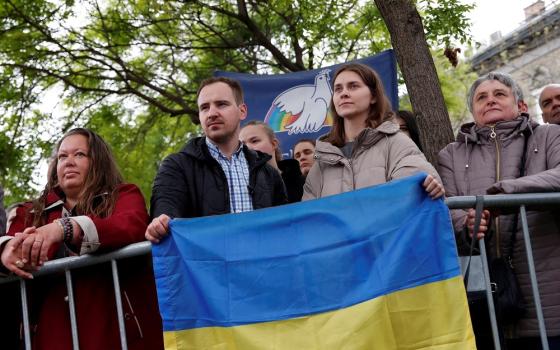Pope Francis waves after celebrating Mass with about 50,000 people in Budapest's Kossuth Lajos Square, with the Hungarian Parliament building in the background, April 30, 2023. (CNS photo/Vatican Media)
Pope Francis wrapped up a three-day visit to Budapest by issuing a final plea for peace in Ukraine and appealing to the often-isolated Hungarian nation not to close its doors to those in need.
"In a special way, watch over the neighboring, beleaguered Ukrainian people and the Russian people, both consecrated to you," the pope prayed at the end of his April 30 Mass here in Budapest.
"You, who are the Queen of Peace, instill in the hearts of peoples and their leaders the desire to build peace and to give the younger generations a future of hope, not war, a future full of cradles not tombs, a world of brothers and sisters, not walls and barricades," said Francis.
The pontiff's remarks came on the final morning of a carefully watched trip where he toed a cautious line on Russia's invasion of Ukraine — issuing repeated calls for peace and meeting with Ukrainian refugees, while avoiding specifics about the war itself.
Hungary, which shares an 85-mile border with Ukraine, is an outlier in the western world, with its Prime Minister Viktor Orban calling for an immediate ceasefire and inching closer toward Russia and China, while distancing the country from the rest of Europe.
Ahead of the pope's arrival here, many western leaders feared the pope's presence in the country would lend support to Orban and undermine efforts to offer a united front in support of Ukraine.
In the end, the pope's words were primarily future-minded, calling for Europe to recommit to multilateralism and to rediscover its Christian roots.
Advertisement
Throughout his weekend stay, Francis emphasized to both the country's church and political leaders that those claiming to be Christians must always be willing to welcome strangers. The country, which has some of the strictest immigration policies in Europe, has recently witnessed over 2 million Ukrainian refugees pass through its borders.
At the final Mass, where some 50,000 Hungarian Catholics filled the square in front of the capital's impressive neo-Gothic parliament building on a bright spring morning, Francis said it was painful to witness the "the closed doors of our indifference towards the underprivileged and those who suffer; the doors we close towards those who are foreign or unlike us, towards migrants or the poor."
Christians, he said, must reject the closed doors of selfishness, individualism and isolationism.
Among those gathering along the banks of the Danube River to attend the pope's Mass were a number of other ecumenical church leaders, as well as representatives of the city's large Jewish community and Metropolitan Hilarion, who until recently served as foreign minister of the Russian Orthodox Church and whom Francis met on April 29 for a private discussion.
"This is the meaning of catholicity," said the pope. "We Christians, all of us called by name by the Good Shepherd, are summoned to receive and spread his love, to make his fold inclusive and never to exclude others."
"It follows that all of us are called to cultivate relationships of fraternity and cooperation, avoiding divisions, not retreating into our own community, not concerned to stake out our individual territory, but rather opening our hearts to mutual love," he said.
The 86-year-old Francis first visited Hungary in Sept. 2021 for the closing of the Eucharist Congress. Following a brief visit of only six hours, the pope vowed to return, setting up another encounter between the isolationist Orban and the more globally-minded Francis.
At the conclusion of a three-day visit — where, despite a stark contrast in worldviews, the two men enjoyed a relatively friendly rapport — the pope had the final word: "Be open and inclusive, then, and in this way, help Hungary to grow in fraternity, which is the path of peace."





